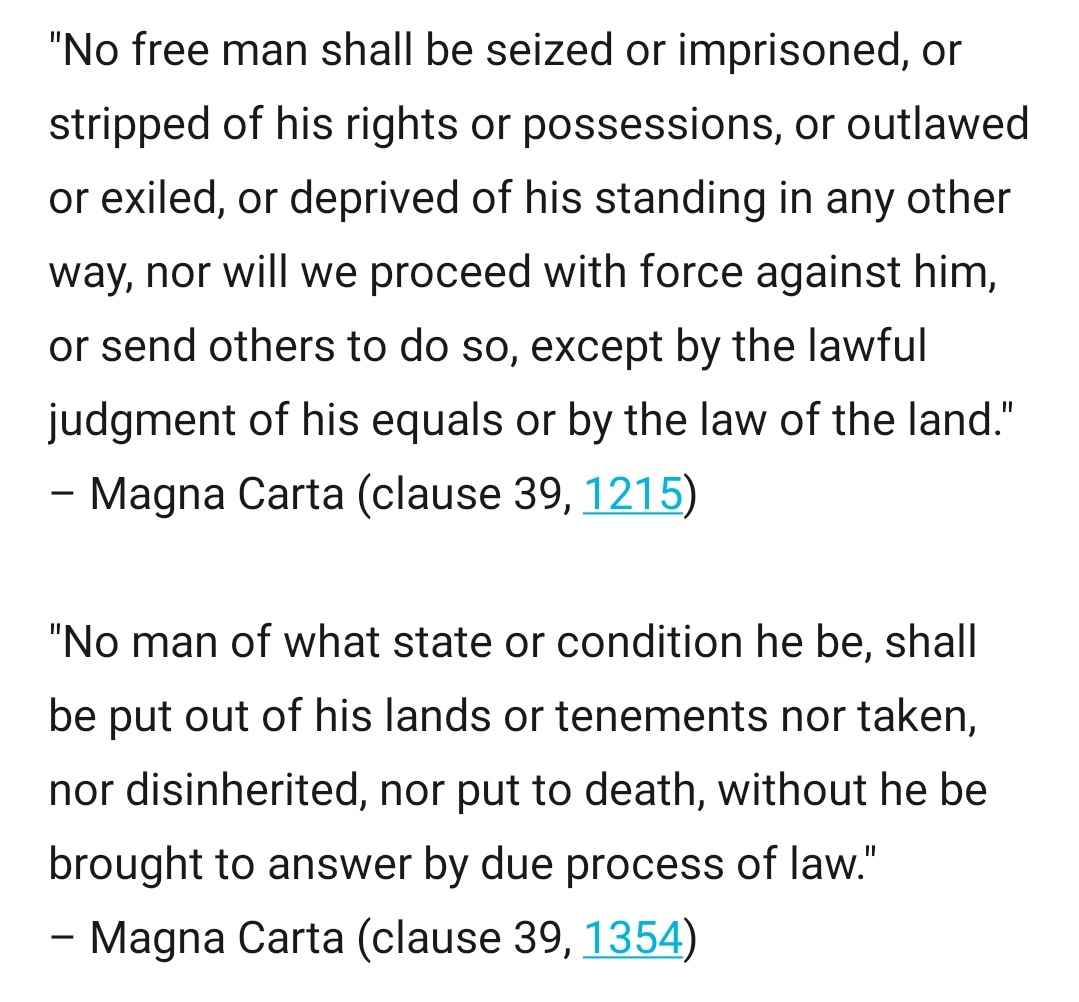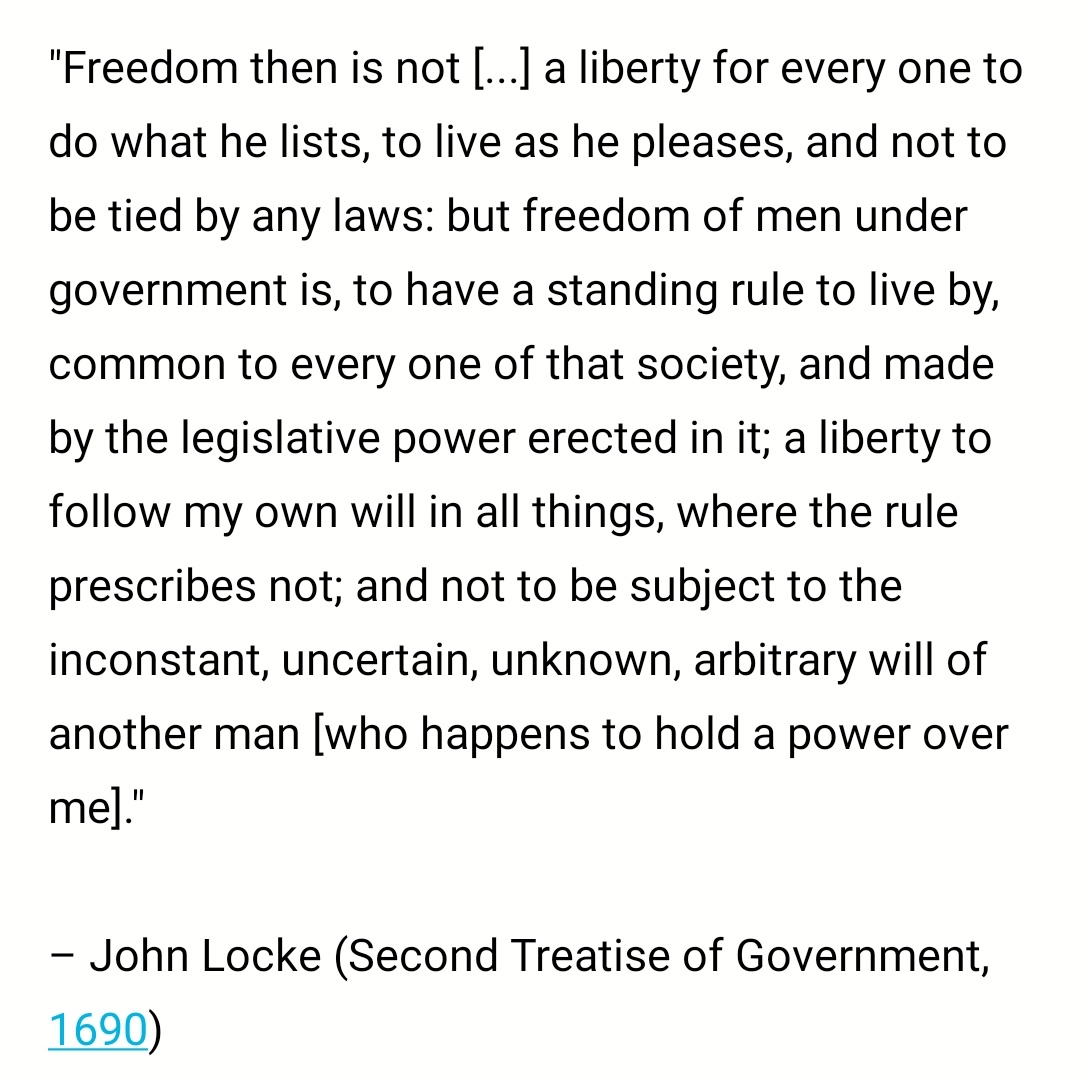If you look at the world, I'd be tempted to go so far as to say that the *single biggest* difference between societies which are pleasant to live in and those which are unpleasant to live in is the presence of due process and the rule of law
If I had to qualify this (and I'm not sure if I would), I'd say that due process and the rule of law must give effect to our natural rights – ie those rights we hold by divine or natural writ, independently of whether anybody recognises them, not created by society or the State
Of course, no one can agree on what these natural rights are!
Locke's famous claim is that they are "life, liberty, and property" – but that in a state of nature with no government, people would have no security in their rights, and live in a state of fear
Locke's famous claim is that they are "life, liberty, and property" – but that in a state of nature with no government, people would have no security in their rights, and live in a state of fear
and subject to the arbitrary wills of whoever happens to hold power over them at any given point.
Accordingly, Locke argued, people would contract away some of their natural rights (ie some of what their rights to life, liberty, and property entitle them to)
Accordingly, Locke argued, people would contract away some of their natural rights (ie some of what their rights to life, liberty, and property entitle them to)
to establish a State which would protect the reserved rights to life, liberty, and property of the people within it, and act as a neutral arbiter towards their disputes.
Note that such a "social contract" would not only cede natural rights, it would also establish
Note that such a "social contract" would not only cede natural rights, it would also establish
"positive rights" of its own: ie rights which don't pre-exist society, but are established by the consent of the people.
For instance, James Madison said the following:
For instance, James Madison said the following:
"Trial by jury cannot be considered as a natural right, but a right resulting from a social compact which regulates the action of the community, but is as essential to secure the liberty of the people as any one of the pre-existent rights of nature."
What's particularly interesting about this comes from recalling the first tweet of this thread.
The right to trial by jury is a due process provision in the original 1215 Magna Carta.
The right to trial by jury is a due process provision in the original 1215 Magna Carta.
This is one way in which due process and the rule of law can be seen to be ultimately downstream of natural rights and the social contract – and so not only should due process and the rule of law incorporate natural rights, the former are justified by the latter.
(But this is an argument to flesh out at another time.)
The importance of due process and the rule of law are a central theme in Islamic law too
Classical fiqh is adamant that the caliph and the saint are equally bound to the shari'ah on earth as are the beggar and the scoundrel (and they will all be judged as equals on Judgment Day)
Classical fiqh is adamant that the caliph and the saint are equally bound to the shari'ah on earth as are the beggar and the scoundrel (and they will all be judged as equals on Judgment Day)
We can see this vividly in the reigns of the rightly guided Caliphs.
Ali (ra) whilst Caliph was stolen from, and rather than using his power to enact personal "justice" against the thief, he took the third to court – and lost, due to their being insufficient evidence to convict!
Ali (ra) whilst Caliph was stolen from, and rather than using his power to enact personal "justice" against the thief, he took the third to court – and lost, due to their being insufficient evidence to convict!
What's even more remarkable is that the thief was a member of a religious minority: the rule of law didn't just bind the Caliph to his Muslim subjects, but all of his subjects.
Another incident:
Umar (ra) came to know that some people had been consuming alcohol. However, they were not punished as he had uncovered this information through spying on what they were doing on their own private property – the evidence was obtained illegitimately.
Umar (ra) came to know that some people had been consuming alcohol. However, they were not punished as he had uncovered this information through spying on what they were doing on their own private property – the evidence was obtained illegitimately.

 Read on Twitter
Read on Twitter



